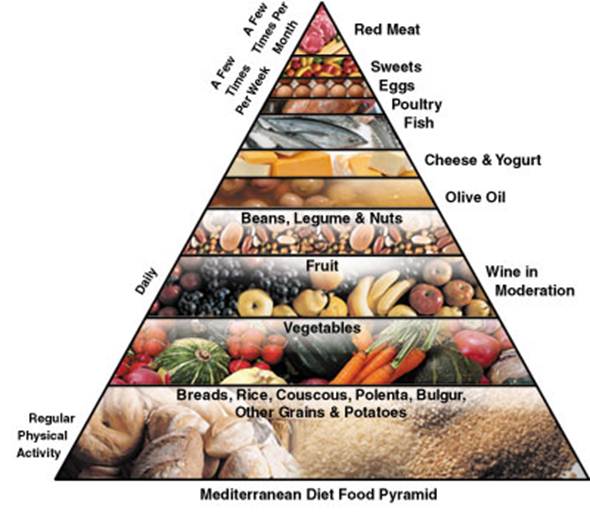Forget everything you thought you knew about
staying slim, fit and healthy. Experts are ripping up the diet and exercise
rule book. And the good news is that the latest advice is easier and far more
user-friendly than the old. Here’s what you need to know…

Try
the two-day diet to stay in shape
We all know the drill we should follow to
lose weight and stay fit – spend hours at the gym and live on lettuce leaves.
The problem is that it simply doesn’t work – because most of us don’t do it. We
struggle to stick with diets, and we’re too tired, too busy or just too lazy to
go to a gym. But there may be another way… A growing number of experts are
suggesting we may be able to achieve most of the health benefits we need with
just three minutes’ exercise and a couple of low-cal days each week. Sound too
good to be true? Read on to discover what the new diet and fitness approaches
could mean for you.
The new diet rules
Even the most dedicated dieters would admit
they find the monotony and restrictions of a 24/7 diet a grind – and it shows.
The average dieter is ready to give up after a few weeks, most of those who
lose weight regain it, and 60% of us are now overweigh or obese. As Dr Susan
Jebb from the Medical Research Council’s Human Nutrition Research Centre says,
we need another way: “We’ve got the all-or-nothing approach – the very
low-calorie diet – and we’ve got long-term, calorie-controlled diets. What we
need is a third way that fits somewhere in the middle.”

Intermittent
fasting could be hugely beneficial to health
That third way could be intermittent
fasting – eating a very-low-calorie diet (VLCD) of around 25% of your normal
intake for one or two days a week, and eating normally the rest of the time.
While it might sound contrary to every healthy-eating rule you’ve ever heard, a
growing body of research shows that occasional fasting doesn’t just help people
lose weight, but can deliver the same health benefits – and more – as a regular
calorie-controlled programme.
Professor Mark Mattson from the US National
Institute on Aging believes that, as well as helping to tackle the obesity
epidemic, intermittent fasting could be hugely beneficial to health. His
research shows that restricting calories triggers processes in the brain that
protect cells from damage and, he believes, potentially guard against
Alzheimer’s, Parkinson’s and other degenerative brain diseases. Another small
study at Newcastle University last year found that when 11 people with type 2
diabetes were put on to a 600-calorie-a-day diet for two months, the diabetes
was reversed in seven of them – something that was previously thought
impossible.
While this kind of calorie restriction
sounds too radical for the average person, other research shows that a less
drastic approach can also have considerable benefits. At the Genesis Breast
Cancer Prevention Centre in Manchester, Dr Michelle Harvie found that two days
a week of slashing your calorie intake can be as effective for weight loss as a
regular calorie-controlled diet, and also has major health benefits. In
devising the diet, Dr Harvie was looking for a different approach to help
overweight women at risk of breast cancer who struggled with regular dieting.

Mediterranean
Diet Food Pyramid
As we reported in our January 2012 issue,
the-two-day-a-week group ate just 650 calories on their diet days, with a
1,800-calorie Mediterranean diet for the rest of the week, while another group
followed a daily 1,500-calorie Mediterranean-style diet. The research showed
that women who cut calories just two days a week were as successful as those
who dieted every day, and the health benefits for the two-day dieters were
actually better.
“The groups lost about the same amount of
weight and had the same health benefits of lowered cholesterol, blood pressure
and biomarkers for breast cancer, but the two-day dieters had greater
improvements in their insulin sensitivity – which means better control of blood
sugar and a lower risk of type 2 diabetes,” says Dr Harvie. It’s thought that
severe calorie restriction causes beneficial changes in the body’s insulin
reception causes beneficial changes in the body’s insulin receptors, and there
are even suggestions that the intermittent approach could help overcome the
weight plateaus that are the bane of every dieter’s life – and which lead to so
many people losing heart and giving up before they reach their goal weight.
It’s not a quick fix, though. Like any
sensible calorie-controlled diet, the two-day approach gives slow, steady
weight loss – and it’s certainly not for everyone. Though it may sound like an
easy option, some people find it harder to stick with than a seven-day-a-week
diet and, in the original study, about half of the two-day dieters dropped out.
But if it’s an approach that suits you, and you can cope with two days of
feeling hungry, it could be the diet for you. Try making your diet days the
ones where you’re busy at work and won’t be tempted, then enjoy the freedom of
eating normally for the rest of the week.
It’s early days, however, and there’s still
much more we need to know about the long-term implications of this kind of diet
and its impact on the body. As Dr Jebb says: “We need to be sure that when
people are left to their own devices they won’t just overeat on the non-fasting
days, and that this type of approach won’t lead to a pattern of bingeing and
fasting. Ultimately, the only diet that really works is the one that people can
stick to and reap the benefits of in the long term.”
Try it yourself
The Genesis 2 Day Diet, which is designed
by dieticians, is based on limiting yourself to 650 calories for two days a
week.

“No
one can deny that they have at least three minutes to exercise every week”
·
On fasting days, eat only four portions of
vegetables, one of fruit, two pints of semi-skimmed milk (or the equivalent in
yogurt: 1/3 pint is equivalent to two 120g pots of diet yogurt), two pints of
other low-calorie drinks and a multivitamin and mineral supplement.
·
The rest of the week, eat a Mediterranean-style
diet of around 1,800 calories, based on fruit, vegetables, fish, nuts,
wholegrains and pulses with only small amounts of meat and low-fat dairy
products. For more details, visit genesisuk.org/research. Click on Genesis Research
Projects and follow the link to the intermittent diet study.